“…a mechanically complex grand strategy machine has evolved over time, before my very eyes, into an epic story.”
Crusader Kings has long struck me as a franchise I would love to get into (as a big fan of Age of Empires and Civilization) but one which is more complex to comprehend than those which I have enjoyed and succeeded at before. With intricacies delving deep into the historic diplomacy of leaders, their vassals and the relationships which forged the bonds of power, alliance, and war around the globe for centuries, Crusader Kings offers a great bounty of depth and content to those who take the plunge into its grandest or strategy games. The attention to detail attached to both foreground and background mechanics are undeniably awe inspiring to consider from the side-lines, but my big questions going in were “will I understand all of this?” and, more importantly, “will this be fun?”…Kin
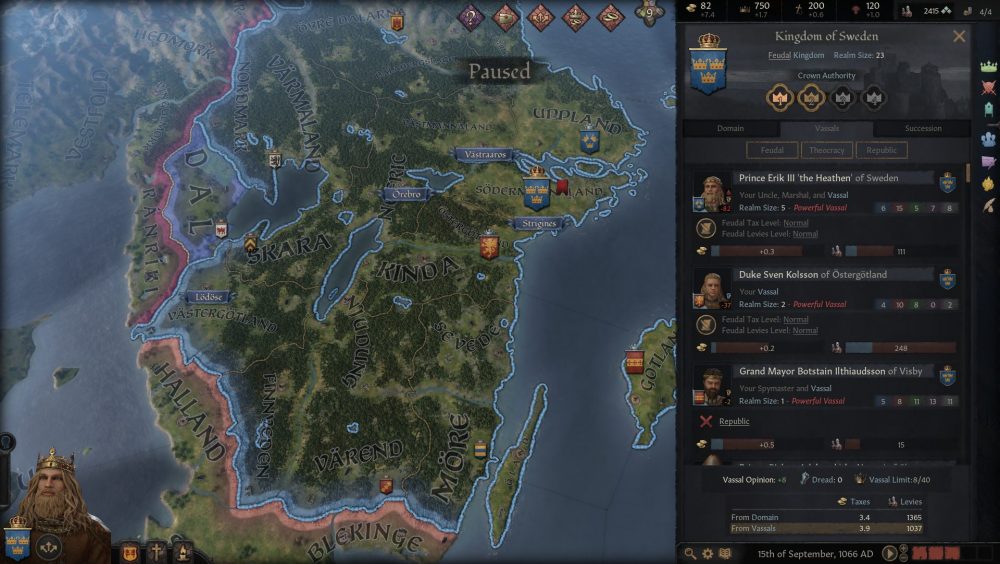
Let me start by saying Crusader Kings III, the latest in the Crusader Kings franchise and from my limited experience of these games by far the most accessible, is indeed possible to understand and capable of providing its own special version of the aforementioned fun. Exploding out of the gates of Paradox’s studios is enough of a credential for any strategy game fan to have their interest piqued. What makes Crusader Kings III particularly interesting, though, is that through successful and popular iterations of the franchise over time the developers have now taken the opportunity to refine elements such as the UI, HUD and tutorial sections to ease new players into the proceedings. This is the area in which CK2 had failed to draw me in time after time, and I was thrilled to jump in and find that Crusader Kings III was prepared to not only welcome me, but to do so with open arms.
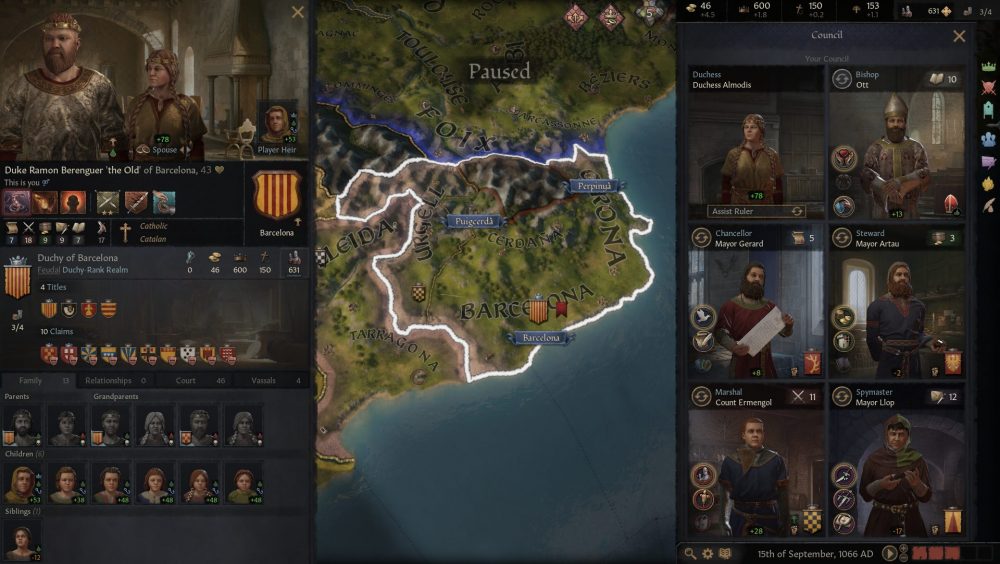
The game has a number of historically informed campaigns to offer, covering a variety of different difficulty levels for new and existing players to enjoy. In Crusader Kings III, the house you choose to lead can be from almost anywhere on Earth, from traditional European regions to the African continent and even within the Arctic Circle. The tutorial campaign though, which proceeds to let you take the reigns when you are ready, introduces you to the game’s systems and mechanics a little closer to home; Ireland. Specifically, you take control of one Petty King Murchad mac Donnchad of Munster; a noble with a claim to stake over the island or Ireland and the military and political backing to pursue it. As the tutorial quickly reveals, achieving this victory is not as straight forward as declaring was across the island and winning with a few ambitious clicks in Crusader Kings III. You will need friends and allies to help you make the first steps (and to fend off the English), and to achieve this you will need to successfully manipulate one of the game’s most fun mechanics; love.
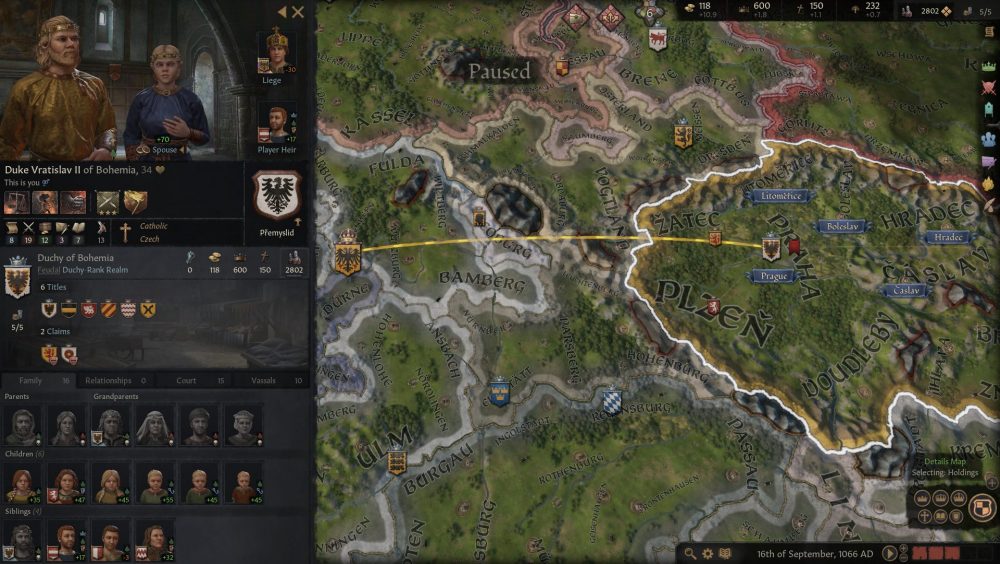
In Crusader Kings III, the legacy of your dynasty is not in the hands of any one king. It will take generations and centuries of planning, successes and failures to achieve your goals. As such, you will need to produce heirs; as will your allies and competitors. Arranging marriages is a powerful tool, then, as well as one of Crusader Kings III’s best systems. Each character in the game has traits which determine their personality and actions. These can be great boons such as generosity and a just conscience or potentially fatal flaws such as jealousy or sickness. Not only can these impact on your character now, but they can also affect your bloodline. Your actions will determine some of these which are both earned and lost as the game progresses, but some can also be inherited by your children and heirs, so smart marriages are a twofold meta-game. First, you want to marry suiters with positive traits that will benefit your bloodline. Secondly, though, and often more importantly, you will need to marry to make friends, allies and ensure the security of your own realm and rule. Naturally, factors such as age, gender, fertility, class and claims to lands are also of great importance, but in a nutshell the best approach seems to be to marry off anyone you can, as well as you can, and profit. That description perhaps undersells how fun this part of the game really is, but this is certainly the most unique selling point of Crusader Kings and the devs have ensured that the system is up-to-scratch accordingly.
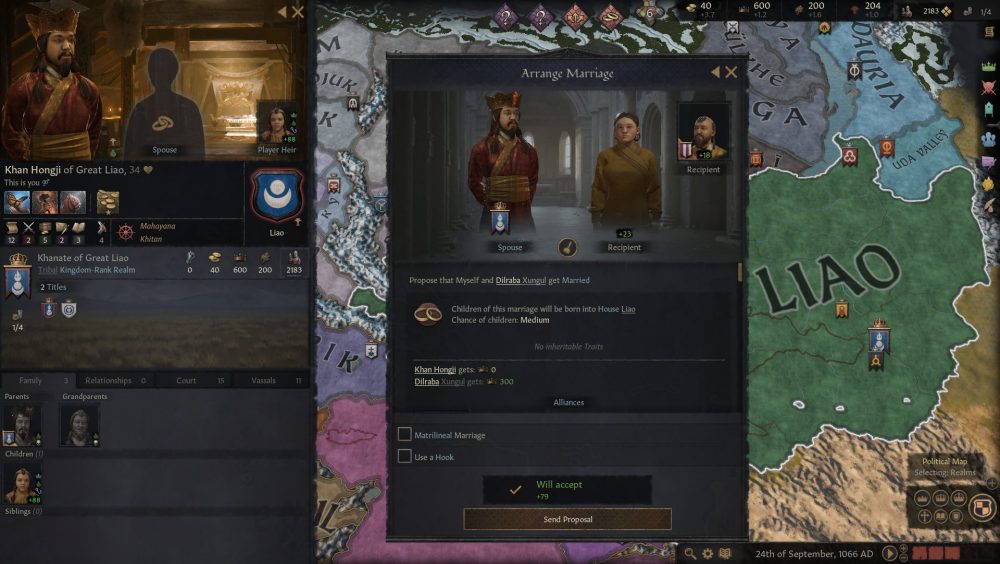
Let’s cycle back now to Petty King Murchad. The man himself has a lot of personality of his own, and this cannot be ignored as a crucial feature of the game either. Early on, when you choose a character to play, you will need to determine their lifestyle. They could be diplomatic, militaristic or simply a good manager, for example, and this choice will determine the areas in which they are most likely to see success in ruling their land and some of the traits they might adopt along the way. For me, given the mission of ruling all of Ireland, Murchad became a powerful military leader, and his background stats supported this choice. Now I was ready to examine my Kingdom and work on the first steps to achieving dominion over it. Fortunately, I owned a few lands already and had vassals (a holder of land by feudal tenure on conditions of homage and allegiance) to support my claims to others nearby. This is where Crusader Kings III becomes really interesting as a strategy title, as to move on these claims I do not necessarily have to start a fight…
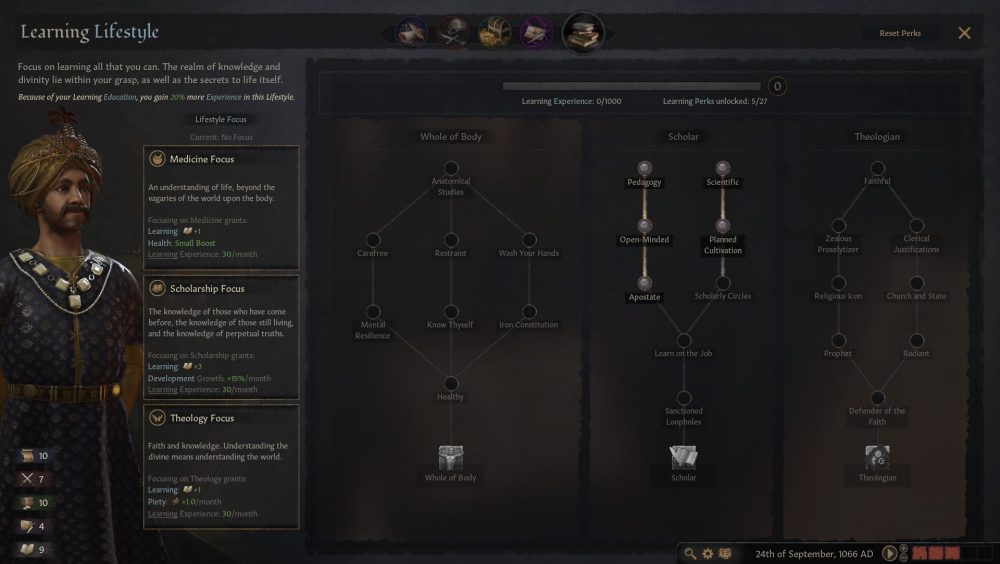
So you’ve seen a land you would quite like to own and you are deciding how to go about it. The first step is checking whether you, or one of your vassals, have a claim over it. If you do, that’s great! You have a casus belli (cause for war) which you can use to justify an invasion. Fighting not your style? That’s fine. With a little persuasion through kindness, or perhaps a little intrigue, you may be able to sway the current Lord to become a vassal under your rule. Perhaps you could even seduce them through the skills of your Court, or quietly arrange to have them… removed. Such schemes are another powerful and enjoyable mechanic of Crusader Kings III, which allow you to “play the long game”, so to speak, is activating your plans without the need to draw swords. Just try not to get noticed or you could find yourself exposed, or worse, blackmailed… Blackmail is a powerful tool of persuasion of its own in Crusader Kings III, allowing you to compel Lords to pay more taxes, foes to agree to one-sided marriage proposals or even shut down a power grab from those you thought to be friends. The message here is this; if you fancy a bit of Lord Nasty’s shiny looking fields as your own, there are a wealth of ways to make this happen, each of which is fun to activate and play. And if all else fails and you can’t find a reasonable claim, just befriend the Pope and ask him to declare one for you. Or fabricate it; that works too…
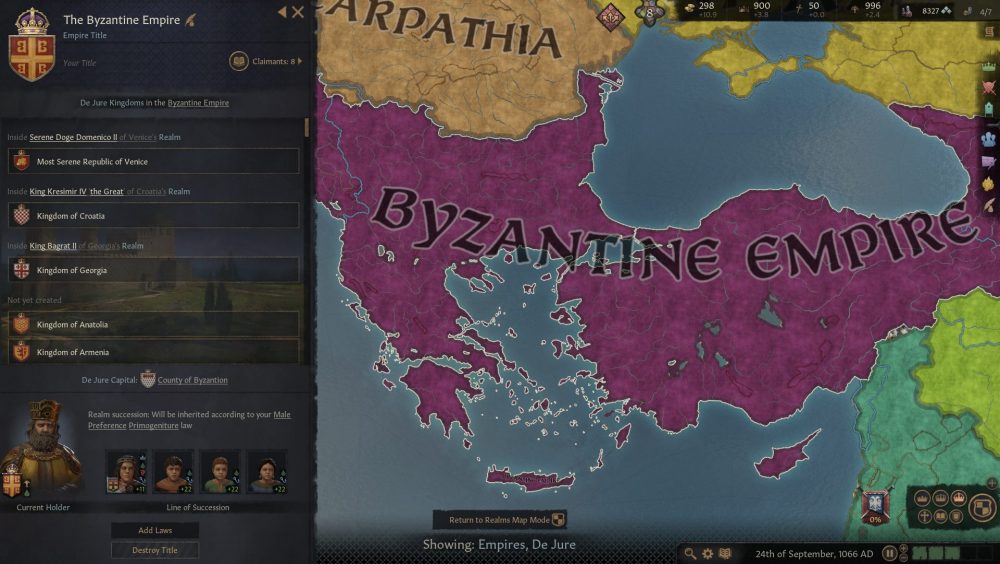
As it stands, I did direct the armies of Petty King Murchad to take two-thirds of Ireland by force, and quite effectively too. My own armies were bolstered by those of a close ally, to whom my child was entrusted as a ward, as well as some hired men-at-arms who turned the tide when it came to siege. This advanced technology took some time to research in the beginning, but turned the tide of battle in my favour as my opponents were forced to play catch up or retreat. Planning and preparing forces for war is more fun than actually fighting in Crusader Kings III, though. Essentially, to start a fight, you need to make sure you have both the numbers and unit-type advantages to overcome the opponent. Then you click where you want your men to go and the whole thing plays out Football Manager-style. This is not an uncommon occurrence in grand strategy titles of this scale, but it is equally not the most exciting warfare to enjoy on the market (see Total War).
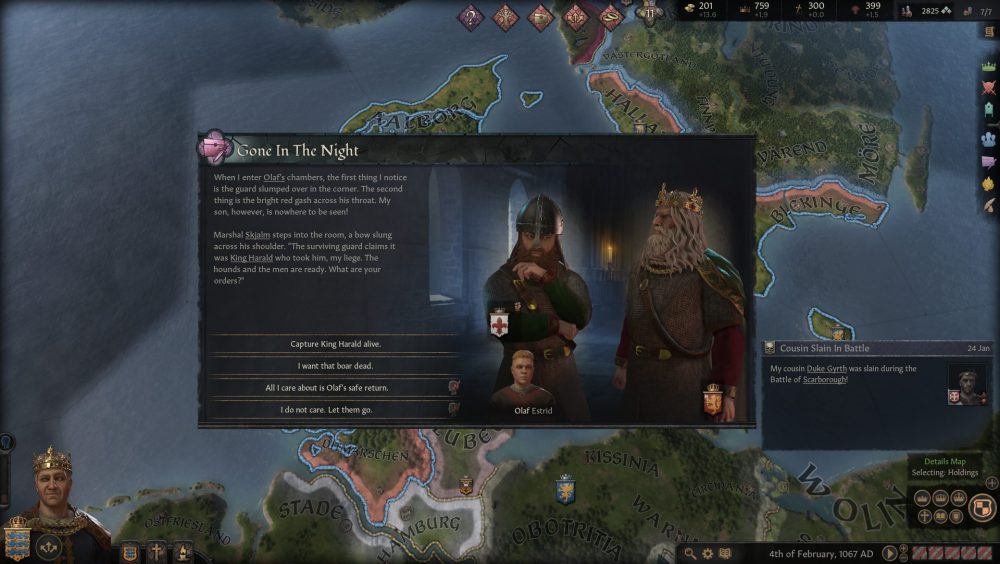
For all of the negotiation, intrigue, warfare and quiet corruption I had achieved as Petty King Murchad over the years, all good things had to come to an end. Before I truly got to achieve his full potential, Murchad passed away and his son and heir was left to rule the kingdom. Sadly, many of Murchad’s equally successful yet ageing Court soon followed suit, and I was left to try and secure a great legacy with a leader who suddenly had few friends and little support. I had to relinquish lands to independence and ultimately fell fowl of the tyrannical King of England. I was forced after a long and pained war to secure my own lands to pledge allegiance to this King, and suddenly realised how my Vassals must have felt these past few decades. Through friendship with the King, and some continued, quiet intrigue on the side, I was still able to secure a position of power on his court. My daughter was to be his beloved, and my conquest was not what it once was, but with only time on my side the opportunity soon arose for me to back a competitor to his throne. After a bit of nasty back and forth I was able to ultimately return to my conquest of Ireland and slowly but surely make progress once again. Crusader Kings III had taught me a hard lesson not to get too comfortable, and my somewhat flippant conquering under Murchad’s rule had certainly evolved into something of a Game of Thrones simulator. Frankly though, despite my hardships, I loved this. When it all went wrong, it was possible to appreciate the intricacies of rule at every level of Crusader Kings III, and I was only left wanting more.
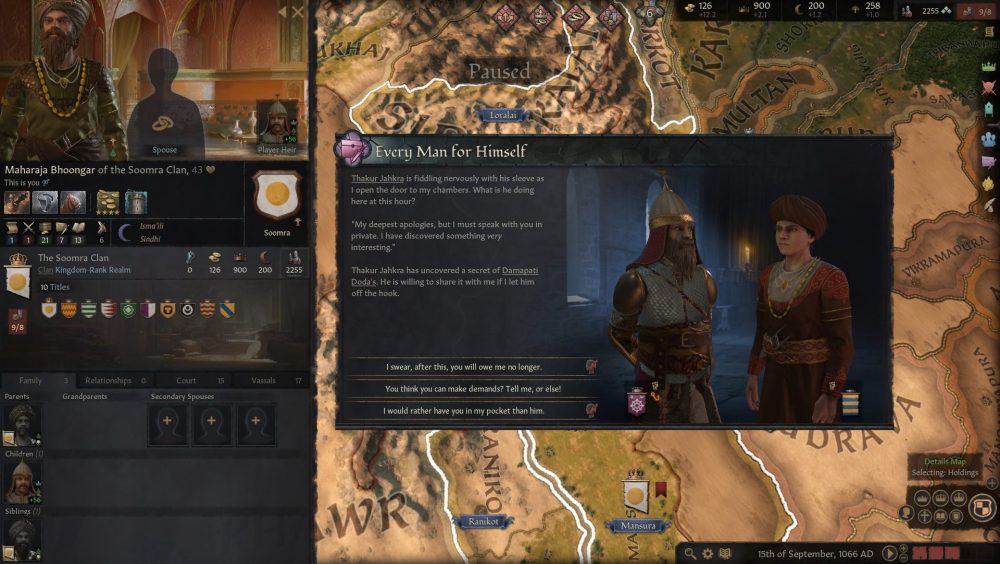
What started out as a mechanically complex grand strategy machine had evolved over time, before my very eyes, into an epic story. Some of the details have barely been touched upon here, either. Some incompetent vassals lost me money, land and more as time went by, and were punished and replaced accordingly. I jumped ship from a failing religion to a rapidly growing one, and provided monetary support to a crusade taking place in the Holy Land. I expanded into parts of Modern-Day Wales as a means of encircling territory in Northern Ireland for capture down the line. I lost a son who was captured in war and assassinated for sharing my blood and name… The possibilities, and the mechanics which sit behind them, seem truly endless in Crusader Kings. I certainly cannot do every single aspect justice in under 10,000 words in this review to explain it all to you, but I hope that I have at least demonstrated the way the game can work, can feel and can completely consume hours of your time in the process. What it lacks in the battle department it makes up for literally everywhere else. I have gone from being scared of Crusader Kings to loving it, and I can’t wait to play and fail at it much more in the future.
You can purchase Crusader Kings III on PC through Steam here for £41.99.
Enjoy the review? want to read more of our reviews? then click right here to be whisked away to the realm of our opinions.
Crusader Kings 3

Paradox Development Studio brings you the sequel to one of the most popular strategy games ever made. Crusader Kings III is the heir to a long legacy of historical grand strategy experiences and arrives with a host of new ways to ensure the success of your royal house.
Product Currency: GBP
Product Price: 41.99
Product In Stock: SoldOut
4

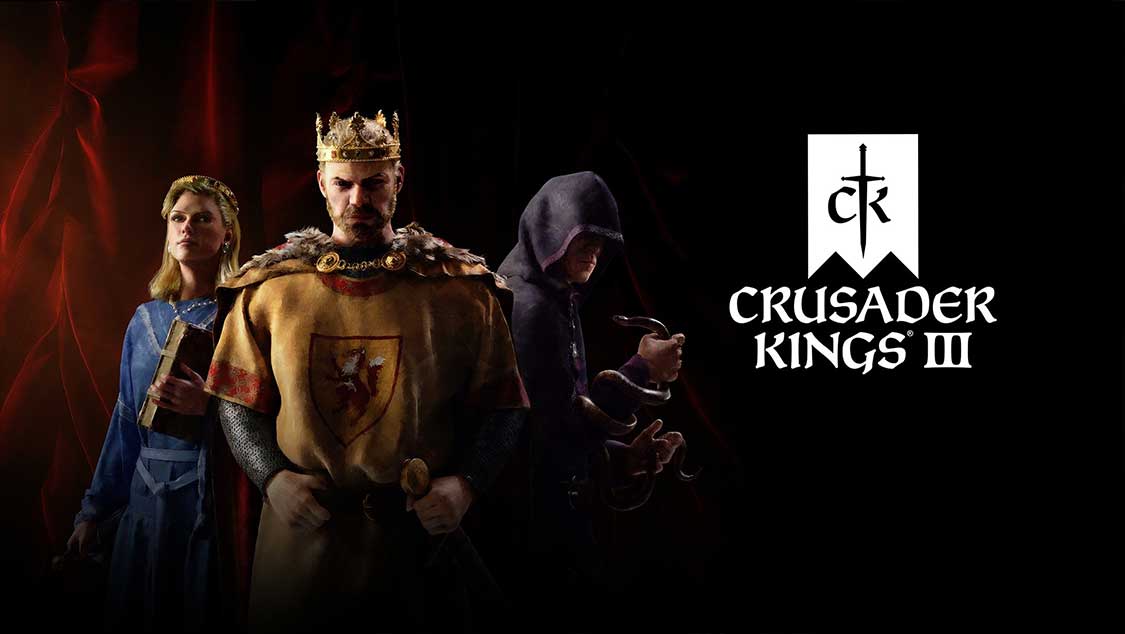






You must be logged in to post a comment.